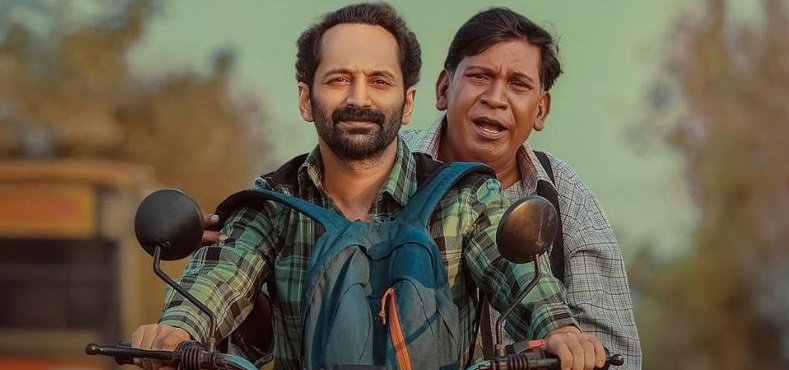Maareesan Review: A Road Drama That Swerves Into a Moral Maze

Maareesan, a Tamil-language drama-thriller released on July 25, 2025, attempts to blend two distinct genres—an emotional road drama and a dark vigilante thriller. Director Sudheesh Sankar, known for his earlier television work and Malayalam films, crafts a story filled with emotion, justice, and psychological undertones. The film stars Fahadh Faasil and Vadivelu, supported by a strong ensemble cast including Kovai Sarala, Vivek Prasanna, Sithara, PL Thenappan, Renuka, Saravana Subbiah, and Krishna. Super Good Films backed the production.
Film enthusiasts anticipated Maareesan as a rare pairing of Fahadh’s intensity and Vadivelu’s surprising turn toward drama. With music by Yuvan Shankar Raja and cinematography by Kalaiselvan Sivaji, the film created buzz before release. Critics and audiences have since responded with mixed opinions, primarily due to the film’s tonal inconsistency and abrupt genre shift.
🧭 Story Summary
The narrative follows Dhayalan, played by Fahadh Faasil, a petty thief freshly released from prison. Dhayalan learns about an elderly man, Velayudham Pillai, portrayed by Vadivelu, who supposedly possesses ₹25 lakh in a bank account. Sensing an opportunity, Dhayalan decides to impersonate the man’s long-lost son to gain his trust and access the funds.
However, Dhayalan discovers that Velayudham suffers from early-stage Alzheimer’s. Velayudham genuinely believes Dhayalan to be his son and seeks to travel across Tamil Nadu to reconnect with his daughter. Dhayalan agrees, hoping to find an opportune moment to extract the money during the journey.
During the first half, the film meanders through quaint towns and emotional memories. Dhayalan and Velayudham form a bond—genuine yet rooted in deception. Then the story shifts sharply. Just before the intermission, Velayudham reveals a dark secret: he hunts down and punishes sexual predators. The old man leads a quiet crusade against injustice, and Dhayalan, shaken and fascinated, joins him.
From this point, Maareesan turns into a vigilante thriller. Dhayalan and Velayudham begin tracking a network of perpetrators, dispensing justice where the law failed. The film’s soft warmth gives way to shadowy violence, creating a disjointed experience.
🎭 Performances
Fahadh Faasil as Dhayalan
Fahadh approaches Dhayalan with his signature restraint and nuance. He conveys the conflict of a man torn between selfish motives and an emerging moral awakening. Fahadh never overplays his emotions. Instead, he allows subtle expressions and eye movements to speak volumes. When the character shifts from conman to conscience-driven accomplice, Fahadh embraces the transformation with conviction. His chemistry with Vadivelu forms the emotional core of the story, elevating scenes that might have otherwise felt mechanical.
Vadivelu as Velayudham Pillai
Vadivelu surprises with his poignant performance as a man wrestling with fading memory and haunted by past traumas. Known for his comedic brilliance, he steps away from his usual image and immerses himself in a role full of sorrow, rage, and vulnerability. He portrays Velayudham’s confusion with heartbreak and his sense of purpose with fire. Audiences and critics alike agree that Vadivelu delivers one of the finest performances of his career.
Supporting Cast
The supporting cast, including Kovai Sarala and Vivek Prasanna, adds texture to the narrative. Kovai Sarala appears in a restrained role, offering support without diverting attention from the central arc. Vivek Prasanna’s role as an investigative journalist adds intrigue, though his screen time remains limited. The other supporting characters function more as plot devices than fully realized individuals, which reflects one of the film’s weaker writing aspects.
🎬 Direction and Writing
Sudheesh Sankar steers the film with an ambitious vision. He begins with a slow, character-driven journey—full of soft interactions and unspoken pain. This direction works well in the first half. Viewers immerse themselves in the evolving dynamic between Dhayalan and Velayudham. However, after the midway twist, Sudheesh accelerates the tone into high-octane vigilante mode. The transition feels abrupt. Scenes that follow lack the emotional buildup needed to justify the narrative leap.
Writer V. Krishna Moorthy, who handled the story, screenplay, and dialogues, inserts compelling themes—memory, grief, justice, redemption—but struggles to connect them cohesively. Dialogues shift from grounded and intimate to preachy and exaggerated. Plot developments begin to feel forced. Characters jump to conclusions, and complex actions receive quick resolutions without satisfying buildup.
📷 Technical Aspects
Cinematography
Kalaiselvan Sivaji captures the visual tone of the film with clarity. The camera follows the characters through rural landscapes, dense cities, and deserted highways. Sivaji uses lighting and shadows effectively, especially during nighttime scenes where Dhayalan and Velayudham execute their vigilante missions. His use of handheld close-ups during emotional moments amplifies intensity, while wide-angle shots during travel sequences highlight the loneliness of the road.
Music and Score
Yuvan Shankar Raja crafts a background score that transitions smoothly between the two halves. He introduces soft, nostalgic themes during the road journey and switches to tense, percussive rhythms once the story turns darker. The soundtrack, while not overly memorable, complements the film’s shifting moods effectively. A few emotional tracks and one rousing theme add depth to the characters’ emotional journeys.
Editing
Editor Sreejith Sarang paces the first half slowly, allowing scenes to breathe and emotions to develop. However, the second half rushes through critical plot points. Flashbacks and exposition pile up, weakening the viewer’s emotional investment. A tighter, more balanced edit could have prevented the tonal whiplash the audience experiences post-interval.
🧠 Themes and Symbolism
Maareesan attempts to raise complex questions about memory, morality, and justice. Velayudham’s Alzheimer’s represents not only his personal deterioration but also society’s tendency to forget victims. Dhayalan’s journey symbolizes moral awakening—a man who begins by exploiting weakness and ends by fighting injustice. These ideas enrich the story conceptually, but the execution lacks the subtlety needed to let them resonate fully.
The vigilante justice narrative provokes debate. While the film highlights the failures of legal systems, it risks glorifying extrajudicial violence. The film hints at moral ambiguity but never fully interrogates it. Instead, it races toward revenge-driven resolutions that undermine the reflective tone established earlier.
📊 Box Office and Streaming Updates
Early box office estimates indicate that Maareesan collected around ₹5 crore on its opening day. Tamil Nadu contributed nearly ₹3 crore, while Kerala generated close to ₹1 crore. The film performed well in metropolitan centers, where Fahadh Faasil enjoys a strong fan base.
Insiders expect Maareesan to premiere on Netflix around August 25, 2025, marking a four-week theatrical window typical for Tamil-language films. Given its polarising reception, the film may find a more appreciative audience on streaming platforms, where viewers can digest its genre-bending narrative at their own pace.
📰 Latest Updates and Public Reaction
Actor Kamal Haasan recently praised Maareesan as a “witty and socially sharp film” in a media interaction. He commended Fahadh and Vadivelu for delivering performances that bridged comedy and conscience with elegance. His endorsement amplified attention on the film across Tamil Nadu.
Viewers across social media platforms remain divided. Some applauded the film’s bold tonal shift and powerful central performances. Others criticized its lack of coherence and sudden descent into melodrama. Fans of Vadivelu celebrated his return to serious cinema and called for more such roles in the future.
Fahadh Faasil continues to dominate headlines as one of India’s most versatile performers. With recent hits and critically acclaimed roles, he remains at the forefront of the South Indian film industry. Audiences have shown increasing admiration for his choices, even in flawed projects.
✅ Verdict
Maareesan begins as a heartfelt, intimate story about trust, memory, and redemption. Fahadh Faasil and Vadivelu breathe life into their roles, drawing the audience into a believable emotional journey. However, the film falters when it shifts gears. The transition from quiet character study to violent revenge saga feels rushed and jarring. Director Sudheesh Sankar introduces important themes but struggles to maintain tonal consistency and narrative depth.
The film ultimately entertains and provokes thought but fails to unify its ideas into a satisfying whole.
🎯 Recommendation
Watch Maareesan if you enjoy:
- Character-driven dramas.
- Strong, layered performances from acclaimed actors.
- Films that experiment with narrative structure and genre.
Skip it if you prefer:
- Consistent tone and pacing.
- Logical plot progression.
- Clear moral framing.













